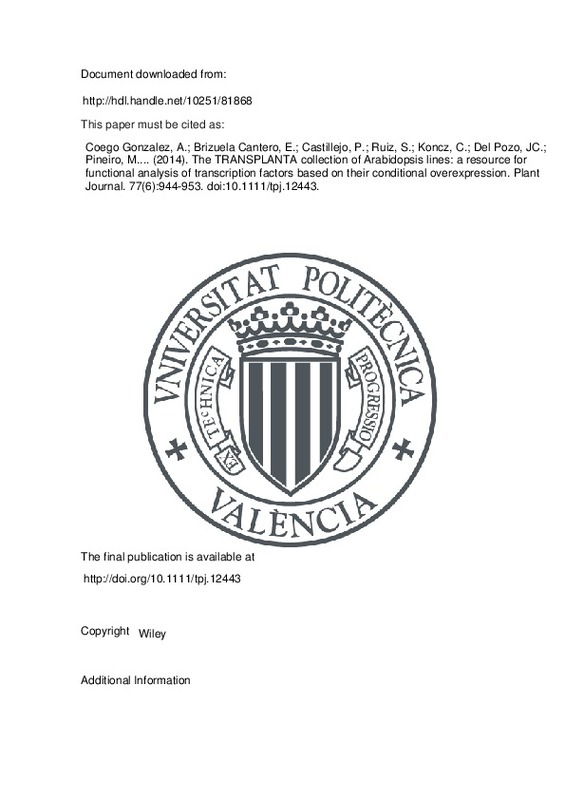JavaScript is disabled for your browser. Some features of this site may not work without it.
Buscar en RiuNet
Listar
Mi cuenta
Estadísticas
Ayuda RiuNet
Admin. UPV
The TRANSPLANTA collection of Arabidopsis lines: a resource for functional analysis of transcription factors based on their conditional overexpression
Mostrar el registro completo del ítem
Coego González, A.; Brizuela Cantero, E.; Castillejo, P.; Ruiz, S.; Koncz, C.; Del Pozo, JC.; Piñeiro, M.... (2014). The TRANSPLANTA collection of Arabidopsis lines: a resource for functional analysis of transcription factors based on their conditional overexpression. Plant Journal. 77(6):944-953. https://doi.org/10.1111/tpj.12443
Por favor, use este identificador para citar o enlazar este ítem: http://hdl.handle.net/10251/81868
Ficheros en el ítem
Metadatos del ítem
| Título: | The TRANSPLANTA collection of Arabidopsis lines: a resource for functional analysis of transcription factors based on their conditional overexpression | |
| Autor: | Coego González, Alberto Brizuela Cantero, Esther Castillejo, Pablo Ruiz, Sandra Koncz, Csaba del Pozo, Juan C. Piñeiro, Manuel Jarillo, Jose A. Paz-Ares, Javier TRANSPLANTA Consortium | |
| Entidad UPV: |
|
|
| Fecha difusión: |
|
|
| Resumen: |
[EN] Transcription factors (TFs) are key regulators of gene expression in all organisms. In eukaryotes, TFs are often represented by functionally redundant members of large gene families. Overexpression might prove a means ...[+]
|
|
| Palabras clave: |
|
|
| Derechos de uso: | Reserva de todos los derechos | |
| Fuente: |
|
|
| DOI: |
|
|
| Editorial: |
|
|
| Versión del editor: | http://doi.org/10.1111/tpj.12443 | |
| Código del Proyecto: |
|
|
| Agradecimientos: |
This work has been performed in the frame of the TRANSPLANTA consortium, which is dedicated to the functional analysis of
Arabidopsis TFs (http://bioinfogp.cnb.csic.es/transplanta_dev). We thank Tono Garc ~ ıa and Juana ...[+]
|
|
| Tipo: |
|







![[Cerrado]](/themes/UPV/images/candado.png)


